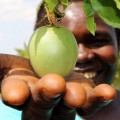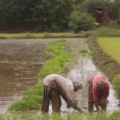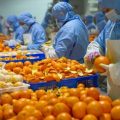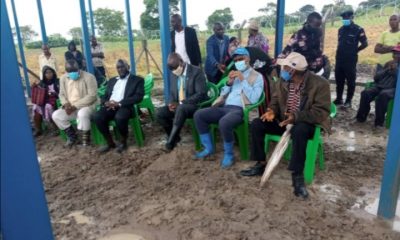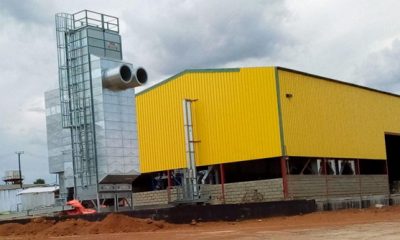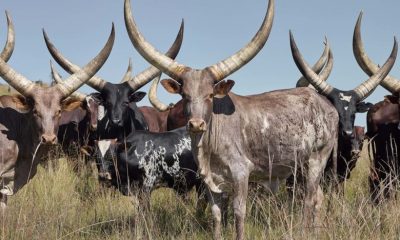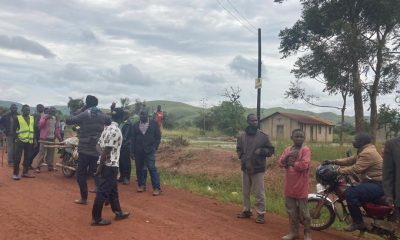by Helen Castell
As China’s government pledges to help funnel more aid, development finance and private-sector capital into African agriculture, what’s motivating the flow and is it having a positive impact?
The flow of Chinese money into Africa is growing fast, with agriculture attracting a sizeable chunk. In 2014, Africa received around 12% of China’s overseas agricultural investment and the proportion continues to grow, according to a 2018 USDA report, which based its calculations on Chinese government data.
Chinese firms investing overseas receive strong financial support from the Chinese government, which sees Africa and agriculture as important to China’s ‘Go Global’ drive
At the 7th Forum on China-Africa Co-operation (FOCAC) held in Beijing September 2018, Chinese President Xi Jinping pledged €52 billion in financing for projects across Africa over the following 3 years. This will include €13 billion in grants and interest-free or concessional loans – three times the amount pledged at the previous FOCAC in 2015 – €17 billion in credit lines, a €9 billion development finance fund and €4 billion to finance imports from Africa.
While Jinping did not detail the projects, he said agricultural modernisation would be a key focus, with the investment including funding for 50 agricultural assistance programmes and to send 500 agricultural experts to Africa to train entrepreneurs and agricultural scientists. Chinese firms would also be encouraged to invest at least another €9 billion in Africa over the period, Jinping added.
Public-private partnerships
While the Chinese government is the main driver for investment in African agriculture, it is increasingly seeking to involve private-sector companies through public-private partnerships, notes Cathy Xi Cao, an independent agricultural analyst at the time of writing. She predicts that this will likely accelerate as China’s huge Belt and Road Initiative (BRI) – which seeks to build trade routes across Europe and Africa – gains momentum. And, while many BRI investments will focus on hard infrastructure, like roads and ports, these should theoretically support agriculture, improving logistics as well as helping farmers reach domestic and overseas markets.
Agricultural technology demonstration centres, typically operated by private Chinese companies with financial support from China’s Ministry of Commerce (MOFCOM), represent China’s most high-profile investment in African agriculture. There are now 23 centres across the continent offering farmers Chinese seeds for rice and other crops, as well as technology and training on cultivating everything from mushrooms to maize and rearing livestock such as cows or poultry.
Proponents of this model include the Bill and Melinda Gates Foundation, which has partnered with MOFCOM to support two centres in Mozambique and Zambia and says that China has valuable technologies to share with Africa, as well as expertise gained during its own agricultural transformation.
Big private-sector Chinese players in African agriculture that have wrapped technical assistance around their investments include Tian Ze, a subsidiary of China Tobacco Co. Since 2005, it has used a contract farming model to expand across Zimbabwe – where, by 2014, it had 387 tobacco farmers in its network – and also into Malawi, Tanzania and Zambia, according to USDA. Tian Ze’s investments reportedly include the provision of low- or no-interest finance to farmers, although exact figures are not available.
Chinese firms investing overseas receive strong financial support from the Chinese government, which sees Africa and agriculture as important to China’s ‘Go Global’ drive. For example, when the Agriculture Development Bank of China and the country’s Ministry of Agriculture agreed in 2016 to provide €390 billion in agricultural lending, supporting Chinese agricultural companies’ overseas investments was cited as one of 10 targets for the money.
Commercial motives
Beijing’s main motivation for supporting investments in African agriculture is widely assumed to be securing food supplies for China but this is not supported by data. Africa supplied only 2% of China’s agricultural imports during 2010-15, according to Chinese customs figures, the USDA report notes. And, while much of its technical assistance and aid focuses on rice, China does not import rice or any other grains from Africa. Indeed, FOCAC stressed in its action plan the importance of helping Africa to achieve food security by 2030.
Rather, aid flows appear to be designed to build goodwill in African countries, facilitating the entry and profitability of Chinese firms, and building markets for Chinese inputs such as rice seeds. For example, investments by Chinese animal feed supplier New Hope Group, including in Egypt and South Africa, focus on building markets in those countries for its feed.
Indeterminate impact
With multiple media reports accuse Chinese entities of ‘land grabbing’ some 6 million ha of land across the continent, the impact of Chinese investments in African agriculture is a sensitive topic. However, the reports appear to have been greatly exaggerated, with the China Africa Research Initiative at John Hopkins University stating that barely 4% of this figure – 252,901 ha – can be confirmed.
China’s readiness to lend to African governments – Kenya, for example, owes around €4.6 billion to China, equivalent to around a fifth of its total external debt – has also raised concerns, with critics alleging it is a way of China gaining political influence, particularly when borrowers struggle to repay. This may or may not be true, but much of this government-to-government lending is focused on energy or transport infrastructure rather than agriculture, where Chinese development and commercial bank lending is directed at Chinese firms.
On an individual farmer level, the impact of Chinese investment has been mixed. For example, while Zimbabwe’s tobacco board has credited Tian Ze’s contract farming model for helping the sector thrive at a time when international sanctions kept investors from other nations away, the Chinese firm reportedly demanded loan repayments from tobacco farmers in 2016 when they could not deliver the crop due to drought and crop failure. And, while Chinese agricultural technology is cheaper than that from the West, some media reports quote farmers as saying that it is still too expensive and that they have learned little of use at Chinese demonstration centres.
CIDCA: a new era?
In April 2018, it was hoped with the launch of the China International Development Cooperation Agency (CIDCA) that Beijing was ushering in a more transparent and collaborative approach to its aid flows in areas including African agriculture and a willingness to acknowledge mistakes. Less than 6 months later, the publication of a joint report by CIDCA and UNDP assessing the impact and effectiveness of two Chinese projects – the Agricultural Technical Cooperation Project in Guinea-Bissau and the Agricultural Technology Demonstration Center in Mozambique – appeared to represent a step in that direction. The report made several recommendations, including that Chinese technical experts stay in-country for longer and engage more with local partners such as farmer cooperatives and NGOs.
Biggest offer on the table
Nevertheless, within the continent and abroad, China’s investment in African agriculture remains controversial. The unusually strong ties between the state and private sector in China are regularly criticised by western governments and companies, who argue cheap funding gives Chinese firms an unfair advantage in markets, including agriculture, and hands Beijing a worrying level of influence over African leaders. Others argue that African farmers will not gain in the long term from a model that is geared towards Chinese commercial interests. For the moment, however, China’s offer remains, if not always the best, by far the biggest offer on the table for African agriculture. Only when rival governments up their own commitments to the sector will this change.
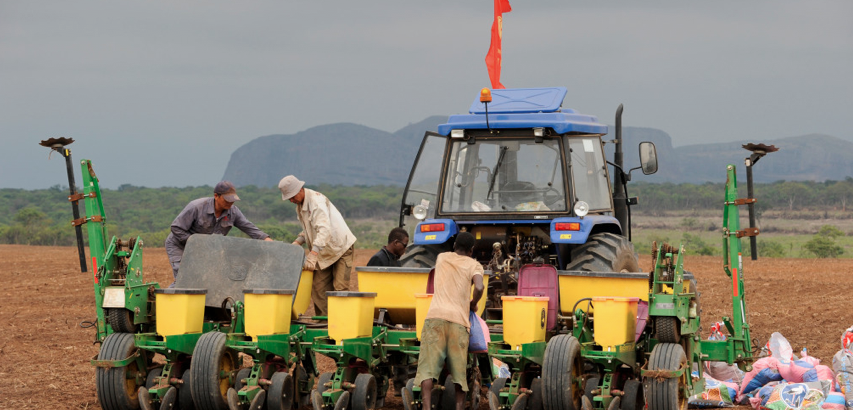

 MEDIA FOR CHANGE NETWORK1 week ago
MEDIA FOR CHANGE NETWORK1 week ago
 MEDIA FOR CHANGE NETWORK1 week ago
MEDIA FOR CHANGE NETWORK1 week ago
 MEDIA FOR CHANGE NETWORK2 weeks ago
MEDIA FOR CHANGE NETWORK2 weeks ago
 MEDIA FOR CHANGE NETWORK2 days ago
MEDIA FOR CHANGE NETWORK2 days ago
 MEDIA FOR CHANGE NETWORK3 days ago
MEDIA FOR CHANGE NETWORK3 days ago
 NGO WORK2 weeks ago
NGO WORK2 weeks ago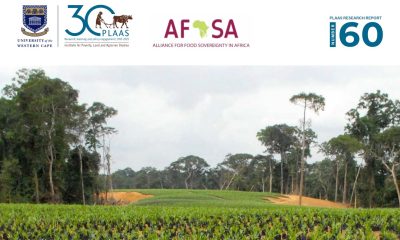
 NGO WORK1 week ago
NGO WORK1 week ago
 NGO WORK1 week ago
NGO WORK1 week ago

